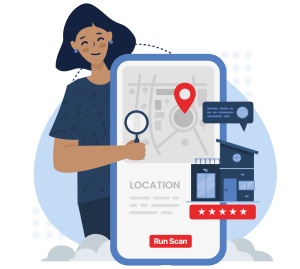Doing on-page SEO is an important part of improving website visibility and ranking higher on search engine results pages (SERPs).
Whether you're a local business aiming to attract customers in your area or a global brand looking to expand your online presence, understanding and implementing effective on-page SEO strategies can significantly impact your website's performance.
In this article, we'll explore the fundamentals of on-page SEO, talk about its importance for local SEO, and describe essential best practices to optimize your website for search engines.
What Is On-Page SEO?
On-page SEO is one of the main types of SEO, and involves the practice of optimizing individual web pages to rank higher and earn more relevant traffic in search engines.
Unlike off-page SEO, which focuses on external signals like backlinks, on-page SEO deals with optimizing elements on your own website. This includes optimizing content, HTML source code, and other aspects that search engines consider when ranking pages.
Why Is On-Page SEO Important for Local SEO?
On-page SEO is a crucial part of any local SEO strategy because it helps search engines understand the relevance and context of your website's content in relation to local search queries.
When done correctly, on-page SEO can improve your website's visibility in local search results, making it easier for potential customers in your area to find and engage with your business.
Best Practices for On-Page SEO
1. Do Keyword Research and Optimization
Conduct thorough keyword research to identify relevant keywords that your target audience is using in search queries. A local rank tracker with a keyword suggestion feature, like Local Falcon, can help you discover new keywords that people are using specifically for local searches.
Once you've identified your target keywords, strategically place them in your page titles, meta descriptions, headings, and throughout your content. However, avoid keyword stuffing, as this can negatively impact your SEO efforts. Your keyword placement should always be as natural as possible.
2. Create High-Quality and Relevant Content
Develop high-quality, engaging content that provides value to your audience. This could include blog posts, articles, videos, infographics, and anything else they might find useful.
Optimize your content for search engines by incorporating relevant keywords in a natural way, using descriptive headings, and including internal and external links to authoritative sources.
Keep in mind that Google is placing more emphasis than ever on ranking content that is actually helpful to readers, so don't just create content full of keywords and fluff, so try to provide in-depth, well-researched information and well-rounded thoughts!
3. Don't Overlook Mobile Optimization
Ensure your website is responsive and mobile-friendly to provide a seamless user experience across all devices.
Improve your website's loading speed by optimizing images, using browser caching, and minimizing server response time. Google's PageSpeed Insights can help identify areas for improvement.
4. Optimize Meta Tags
Write descriptive, keyword-rich title tags that accurately describe the content of your web pages. Keep them under 60 characters to ensure they display properly in search results.
Craft compelling meta descriptions that entice users to click on your search result. Include relevant keywords and keep them under 160 characters. It's a good idea to include a call to action, as well.
5. Build a Strong URL Structure
Create SEO-friendly URLs that are descriptive and contain relevant keywords. Avoid using generic URLs with numbers and symbols.
6. User Experience (UX) Optimization
Ensure your website has clear and intuitive navigation to help users easily find the information they're looking for. Incorporate engaging multimedia elements like images, videos, and infographics to enhance user experience and encourage longer site visits.
Overall, Google prioritizes sites with good user experiences and helpful content, so the better your site is for visitors, the more likely it is to rank highly on Google.
On-Page SEO and Local SEO: More Tips
1. Local Keyword Optimization
Wherever it's possible to do so without forcing it, include local keywords in your content. These could be geo-tagged keywords related to your products or services that include variations of your city, region, or neighborhood name to target local search queries. For example, "best pizza in [city]" or "top cosmetic dentist in [neighborhood]."
2. Local Schema Markup
Implement local schema markup on your website to provide search engines with specific information about your business, such as your address, phone number, and business hours.
3. Google Business Profile Optimization
While it's not directly part of on-page SEO, it's important to optimize your Google Business Profile with accurate business information, including your name, address, phone number, and website URL.
Encourage customers to leave reviews and ratings on your GBP, as positive reviews can improve your local SEO.
Since Google Business Profiles are displayed above websites in local search results, optimizing your GBP is the best way to have a chance at appearing in Google's 3-Pack, the top 3 results on Google.
4. Local Content Optimization
Create content that is relevant to your local audience, such as information about local events, news, and community initiatives. This can help attract local traffic to your website and provide more opportunities to naturally include local keywords on your site.
5. Local Link Building
Start initiatives to build local backlinks from reputable local websites, directories, and organizations to improve your website's authority and relevance in local search results.
Conclusion
By implementing these best practices for on-page SEO, you can enhance your website's visibility, attract more relevant traffic, and improve your overall search engine rankings.
Remember that any type of SEO is an ongoing process, so regularly monitor your website's performance and make adjustments as needed to stay competitive, and don't forget to optimize your Google Business Profile and track your GBP ranking with Local Falcon!


